Moving The RNC? Cities Aren’t Raising Their Hands
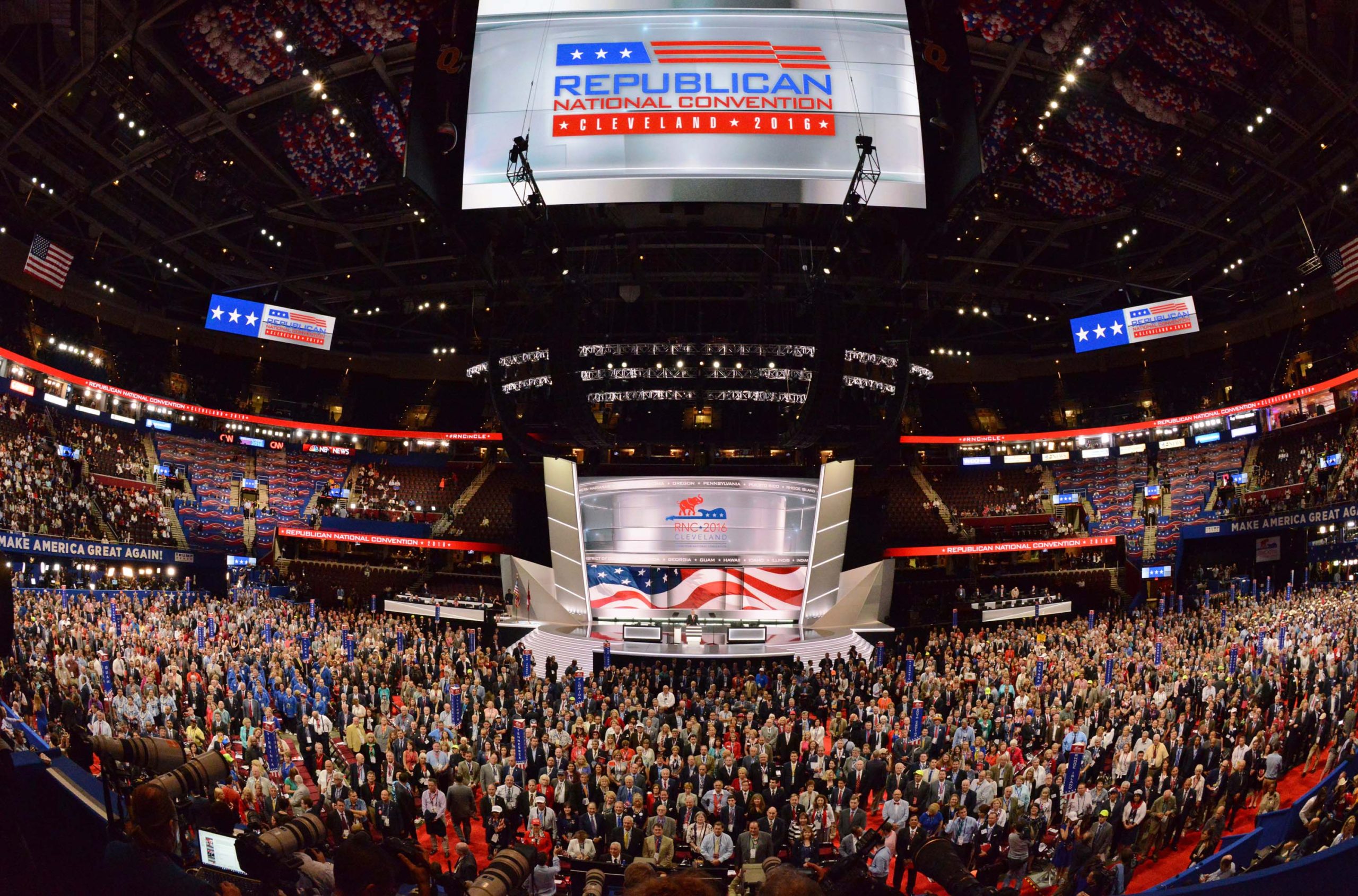
There are 88 days until the scheduled start of the Republican National Convention in Charlotte.
Or should we say in Atlanta, Jacksonville, or Orlando?
In this episode of Inside Politics, we will look at President Trump’s tweets and comments about possibly moving the convention, which were backed up by Vice President Mike Pence.
The president gave Gov. Roy Cooper an ultimatum on Twitter. He said Cooper, a Democrat, is in a “Shutdown Mood” and that Republicans “must be immediately given an answer … as to whether or not the space (The Spectrum Center) will be allowed to be fully occupied.”
If the state doesn’t give the GOP that assurance, Trump said, “we will be reluctantly forced to find another site.”
Pence agreed. Speaking on “Fox & Friends,” he said, “We all want to be in Charlotte. We love North Carolina. But having a sense now is absolutely essential because of the immense preparations that are involved.”
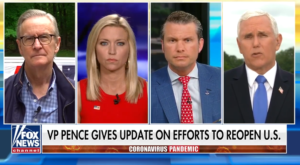
But he said Republicans are prepared to move “the national convention to a state that’s farther along in reopening.”
He mentioned Georgia, Texas, and Florida as states that could host the convention. The next day, Georgia Gov. Brian Kemp and Florida Gov. Ron DeSantis raised their hands.
We’re going to unpack all of this.
What are the chances another city would take all — or part — of the RNC? Could any other place give the president the assurances he’s asked North Carolina Gov. Cooper for? Could the city of Charlotte be stuck with millions of dollars in unreimbursed security expenses?
And what happens to the $70 million the local host committee is responsible for raising in the event the RNC moves, or if the convention is only a fraction of what was promised?
First, let’s look at the state of reopening in North Carolina that seems to have gotten the president upset. We are in Phase 2, which means no more than 10 people can gather inside at one time. That’s supposed to last until at least June 26.
In an interview with WFAE last week, North Carolina Health and Human Services Secretary Mandy Cohen said that if the number of coronavirus cases in the state continues to go up mass gatherings are going to be a big challenge.
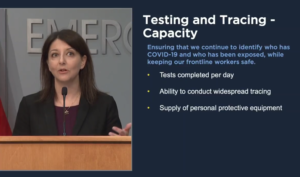
“We know just from looking at the evidence that these mass gatherings are places where a lot of people come together,” she said. “That is a recipe for viral spread, right? Particularly when you are indoors and you are close together for longer periods of time. And I’m describing the Spectrum Center. And that’s challenging. I think it’s too early to say what does that really mean.”
Her advice for the Republican National Committee is “hope for the best, and plan for the worst.” And she said her team has been in contact with those organizing the convention.
Cohen released a letter she sent last week to Marcia Lee Kelly, the CEO of the convention, asking for a written safety plan for the convention, as well as for the GOP to plan out different scenarios.
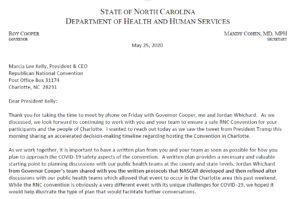
On Tuesday, Cooper refused to answer whether the RNC can go on as planned. He said we don’t know what situation we’ll be in three months from now.
“I will say that it’s OK for political conventions to be political, but pandemic response cannot be,” Cooper said.
Following Cooper’s press conference, Trump when pressed came up with a deadline to hear from the governor.
“Yeah, I’d say within a week that certainly we have to know,” Trump said. “Now, if he can’t do it, if he feels that he’s not going to do it all, he has to do is tell us and we’ll have to pick another location and I will tell you a lot of locations want it.”
Is this all bluster — a way to blame the need for a smaller convention on a Democratic governor — or could a city in another state promise a full-scale convention now?
There are two ways to look at this — public health and political will.
Let’s look at the three states that Pence mentioned as states that have reopened quickly – Texas, Georgia and Florida.
The governors of Georgia and Florida have offered to hold the RNC, but it comes down to city leaders to make that call — and no city in those states bid on hosting the RNC in 2018. In fact, no other city besides Charlotte bid on hosting the convention at all.
In Georgia, Atlanta is a Democratic enclave. Atlanta Mayor Keisha Lance Bottoms said she’s opposed to hosting. That leaves … Savannah? Macon? It’s unlikely they could stage even a convention that attracts 10,000 people, much less 50,000.
In Texas, state Republican leaders have said they want to host.
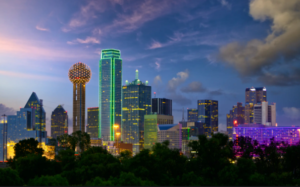
But Craig Davis, the CEO of the Dallas tourism bureau, said it’s difficult to pull off a political convention in normal times on such short notice.
“Not one city in Texas could give assurance to the RNC about our ability to pack an arena or to maintain social distancing or anything like that in this post-COVID world,” he said. “We simply don’t have direction from any of our agencies that would otherwise be giving that type of permission to us.”
Davis continued: “Any convention that we have in the future in the near term won’t be the same size as it was originally booked for so I don’t believe the RNC or DNC would be any different. So we don’t think we’d be able to have full capacity under the current conditions.”
That suggests that Dallas is out. And even though Texas is a red state, almost all of its major cities have Democratic mayors: Dallas, Houston, Austin, San Antonio.
And even though the response to the virus is supposed to be apolitical, the two political parties see reopening differently.
Florida is similar to Texas. It’s a red state – or reddish state – but it’s major cities have lots of Democratic voters, like Orlando, Tampa and Miami. They have made no noises about hosting.
Jacksonville, however, has raised its hand. It has a Republican mayor and a Republican City Council. The mayor, Lenny Curry, said he’d be honored to host the RNC.
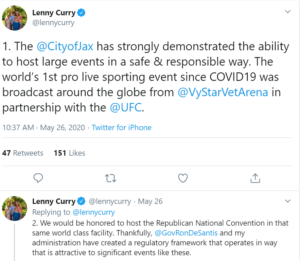
But Republican council member, Matt Carlucci, is concerned about moving too quickly.
“If I was in administrative leadership or if this comes before council, I’d really want to talk to a lot of health specialists and get as much information as I could before I started packing thousands and thousands of people into a small arena,” he said.
Jacksonville has hosted a Super Bowl, so it could do something that large. But Gov. DeSantis’s offer did come with a caveat … as best we can under whatever safety requirements are in place.
The dynamic today is similar to 2018. Before awarding the convention, to Charlotte, the GOP was trying to drum up interest in another city trying to host the convention. That’s when the Nevada Republican Party said it could bring the convention to Las Vegas – even though the city, county and tourism authority there weren’t involved.
And behind the scenes, the New York Times has reported, the White House is looking at the possibility of a pared-down convention. Even Trump, it reports, has asked aides why it can’t be held in a hotel ballroom in Florida, given the health concerns. Although the president later said on Twitter the hotel ballroom idea was “fake news.”
What’s going to make this difficult is there’s no way that North Carolina can assure the GOP the convention can move forward as they want. Based on the trends here, we are arguably in worse shape than Georgia and Florida, with hospitalizations and cases going up.
There has been a lot of talk about whether the GOP can move the convention. Does the contract with the city allow the event to be moved?
It doesn’t. But: The GOP could argue that Cooper’s rules won’t allow the convention to move forward.
Right now under Phase 2, the state only allows for inside gatherings of 10 people, at the most. But Phase 2 rules do allow for the Spectrum Center to stage made-for-TV events like a sporting event or a concert. And all of the people who would be required to put that event on – athletes or performers or tech crew – would be exempt from that 10-person mass gathering limit.
We wondered what that meant for delegates. Would RNC delegates count as spectators and be subject to any limit on mass gatherings? Or would they be considered essential?
“That would be a spectator,” Cohen said. “In my mind. They’d be sitting in sort of spectator parts of the Spectrum Center. And I think these details that we would work out with the RNC, but yes, they are spectators.”
So under Phase 2, you can have more people at a swimming pool than you could have delegates at the RNC. And those limits extend until June 26, though that could be moved up or extended.
What would happen if the convention left? Would the city sue the RNC and force them to come? Or would the reaction be good riddance?
There was a recent 6-5 vote on whether to accept the city’s $50 million federal security grant. The council members who voted no did so as a protest vote.
City Council member Malcolm Graham voted in favor of accepting the money but said he would not try and make the RNC stay in Charlotte.
“I can speak for myself — I won’t,” he said. “Because my concern is public health – not appeasing the president.”
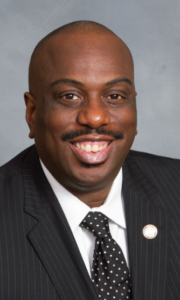
For Mayor Vi Lyles, the convention has been a headache for two years — first because of the blowback over agreeing to host, and now the pandemic. She is taking a very neutral approach in her public comments. She said public health will determine whether the convention moves forward.
What if the RNC chooses to hold a small convention here with only delegates meeting in small groups to formally nominate the president? The president may not even need to come in that case.
The Charlotte city attorney, Patrick Baker, said that still counts, per the contract.
“There’s nothing in that document that talks about the number of people that have to be here, the number of beds that they are going to take up,” he said. “I don’t think there is a reference to the president of the United States.”
The city has already started spending money on security for the convention. The Department of Justice has agreed to reimburse the city up to $50 million in security costs, which is standard for a convention.
But what happens if the RNC moves or remains in Charlotte in a diminished state?
The city said it’s already spending money on buying police equipment for the convention, but, citing security concerns, it won’t stay what. Is it possible that the Justice Department might delay or withhold that money from the city if the president is upset that Charlotte has spurned him?
“When we did formally accept (the grant) we were legally entitled to rely on it,” Driggs said. “We would go to court if they tried to withhold that money.”
Another important question is, if the convention moves or is scaled back, what happens to the $70 million the local host committee is tasked with raising?
The local host committee has raised that money for things like building the stage, renting the arena and for transportation. John Lassiter, the president of the local host committee, said he’s raised about $50 million so far.
Much of that money has been raised on the promise that it’s a way to showcase Charlotte to the world. Lassiter wouldn’t say how much of that $50 million is pledges compared with how much is in the bank.
“I’m not going to discuss how much particularly raised are from who or when,” he said. “So we’re in a good place for paying our bills. And we’ll continue to raise money and we’re confident we’ll be in the position to put on the convention.”
When asked what would happen to that $70 million if the RNC doesn’t come to Charlotte – of it holds a scaled-back convention – Lassiter wouldn’t say.
“I don’t speak for the RNC,” he said. “We work with them to put this convention on. And, you know, we’re going to play the hand we have and put on, as you know, a convention that allows us to showcase our community. To talk about the resiliency that we have, the strength of our businesses, and let the world see.”
We asked the Republican National Committee that same question this week. What would happen with that money if the convention moved to another state? The RNC didn’t respond.
Duke Energy is one of those big donors to the host committee. At the company’s annual shareholder meeting earlier this month, CEO Lynn Good said its contribution will be commensurate with other large companies in Charlotte.
“The RNC will be a great opportunity to bring economic development to our headquarter city in Charlotte, North Carolina,” she said.
She added that given the current impact of the virus, Duke is monitoring the ongoing developments and working with the city and organizers as planning continues.
After the president’s comments, we asked a Duke spokesperson if the company is rethinking its contribution. A spokesman said it’s premature to discuss that.
Click here for the latest coronavirus news on WFAE’s live blog.
Sign up here for The Frequency, WFAE’s daily email newsletter.
What questions do you have about the coronavirus? What has this experience been like for you? Share your questions below.
_